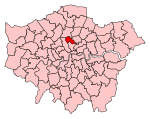Seven Sisters Road

Seven Sisters Road is a road in north London, England which runs within the boroughs of Islington, Hackney and Haringey. It is an extension of Camden Road, running from Holloway Road (the A1 road) at the Nags Head crossroads then on to another crossroads with Blackstock Road and Stroud Green Road. It carries on uphill alongside Finsbury Park to Manor House, and from there downhill to the junction with Tottenham High Road (the A10 road) at Seven Sisters Corner. The road was authorised in 1829 and constructed in 1833 by the Metropolitan Turnpike Trust. Seven Sisters Road is part of the A503. The stretch running past Finsbury Park is open to the park on the west side, and on the east side are large Victorian villas now used mainly as hotels. The "Seven Sisters" after which the road is named were seven trees located opposite its junction with Tottenham High Road. This is made clear in the legislation authorising its construction, where the route of the road was described as running "from the Stamford Hill Road in the Parish of Tottenham , in the said County of Middlesex, nearly opposite to certain Trees called the Seven Sisters".This junction is known as Wards Corner, reflecting the name of the large department store that stood on this corner. The Hetchins bicycle shop and frame factory were situated in Seven Sisters Road, on the site of what is now Apex House. In the early morning hours of 19 June 2017, a man rammed a vehicle, hitting pedestrians on Seven Sisters Road near the Finsbury Park Mosque. One person was killed and about 10 were injured during the attack.
Excerpt from the Wikipedia article Seven Sisters Road (License: CC BY-SA 3.0, Authors, Images).Seven Sisters Road
Seven Sisters Road, London Finsbury Park (London Borough of Islington)
Geographical coordinates (GPS) Address Nearby Places Show on map
Geographical coordinates (GPS)
| Latitude | Longitude |
|---|---|
| N 51.56101 ° | E -0.11363 ° |
Address
Atlas Cafe
Seven Sisters Road 146A
N7 7PL London, Finsbury Park (London Borough of Islington)
England, United Kingdom
Open on Google Maps







